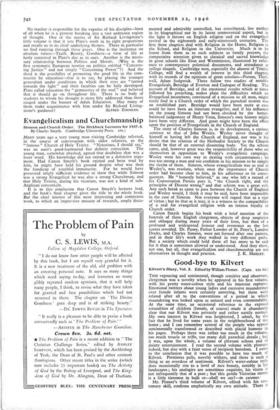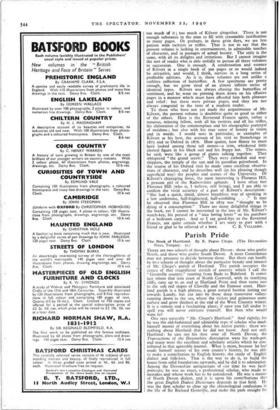Good-bye to Kilvert
Kilvert's Diary, Vol. 3. Edited by William Plomer. (Cape. 12S. 6d.)
Tuts vapouring and sentimental, though sensitive and observant, clergyman was a novelty when he appeared in his first volume, with his pretty water-colour style and his innocent raptures. Emotional twitters about young ladies and excessive maunderiugs over female infants were certainly annoying, but these were related after all to the conventions of a period in which maundering was looked upon as natural and even commendable. At the same time, an occasional reference to the exposed rotundities of children (female, of course) made it abundantly clear that our Kilvert was privately and rather nastily normal. My own interest in Kilvert was heightened, I admit, by the fact that he lived for some years in the neighbourhood of my home ; and I can remember several of the people who appear sentimentally transformed or described with placid humour in his pages. Perhaps there was rather too much in the volume, too much treacle or trifle, too many dull parochial details • but it was, upon the whole, a volume of pleasant echoes and of dainty entertainment. I read the second volume with pleasure indeed, but also with a faint sense of incipient boredom. I c.ame to the conclusion that it was possible to have too much of Kilvert. Prettiness palls, novelty withers, and there is such a thing as an overdose of sentiment. Kllveres water-colour style does occasionally rise to a level of rare beauty, notably in his landscapes ; his analogies are sometimes exquisite, his vision is not infrequently that of a poet ; but' this gentle Victorian curate is a little tiresome in bulk or—shall we say?—in extens0.1 Mr. Pinar. er's third volume of Kilvert, edited with his cus- tomary skill, confirms emphatically my own attitude. There is too much of it ; too much of Kilvert altogether. There is not enough substance in the man to fill with reasonable justification so many pages. Or perhaps, in these grim days, we are less patient with twitters or trifles. That is not to say that the present volume is lacking in entertainment, in admirable touches of character, and in passages of actual beauty. The style is the same, with all its delights and irritations. But I cannot imagine the sort of reader who is able stolidly to peruse all three volumes in succession. One is enough. A condensation and essence of Kilvert in a single book of 300 pages or so would indeed be attractive, and would, I think, survive in a long series of profitable editions. As it is, these volumes are not unlike a ruthless collection of butterflies. A few specimens are pretty enough,. but we grow tired of an almost infinite series of identical types. Kilvert was always chasing the butterflies of sentiment, and he went on pinning them down on his effusive pages in a manner which must have afforded him both pleasure and relief : but these were private pages, and they are not always congenial to the taste of a modern reader.
To those who have not yet made the acquaintance of Mr. Kilvert, the present volume is doubtless quite as good as either of the others. Here is the Reverend Francis again, rather a tenuous, mincing fellow, with all his twitters and all his trifles, his elaboration of the commonplace and his oleographic portrayal of maidens ; but also with his true sense of beauty in vision and in words. I would note in particular, as examples of Kilvert at his best, the account of his visit to Stonehenge in 1875 and to Oxford in 1876. How quaint, how flimsy he must have looked among those tall stones—a trim, whiskered little clerical figure in his black suit and his floppy hat. The stones, he said, were like a group of giants talking together. They whispered "the grand secret." They were cathedral and wor- shippers, the temple of the sun and its guardian priesthood. In the course of his Oxford visit he made some excellent observa- tions of character, and he describes well (in his pleasing though superficial way) the peoples and scenes of the University. Of Kilvert's chirruping loves, the most interesting is Florence Hill, a peasant girl of the Radnorshire uplands. I have often met Florence Hill (who is, I believe, still living), and I am able to confirm the vivid accuracy of a part of Kilvert's description: "She had a quick, timid, almost breathless way of speaking in a low undertone, half-frightened, half-confiding . . ." It may be observed that Florence Hill in 1879 was "thought to be dying of a consumption." There are many delightful things in the book, yet I cannot be interested in the loss of Mr. Kilvert's watch-key, his perusal of a "nice loving letter" or his purchase of a bedroom carpet. And so I say good-bye to the Reverend Francis, not quite certain whether I am sorry to part with a friend or glad to be relieved of a bore. C. E. VULLIAMY.



























































 Previous page
Previous page